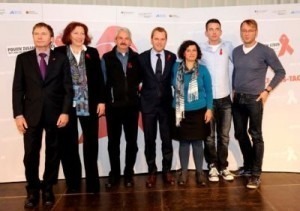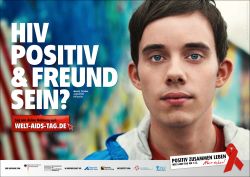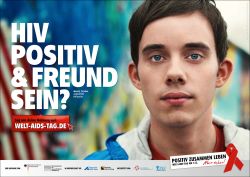Today marks the start of the nationwide World Aids Day campaign "Positiv zusammen leben. But safely!". One of its faces is IWWIT role model Marcel. After the big opening press conference, we asked him why he was there
Federal Health Minister Daniel Bahr opened the current World AIDS Day campaign "Positively living together. But safely!". The focus is on HIV-positive people who talk openly about their experiences with HIV infection. With questions such as "HIV-positive and being a mother?" or "HIV-positive and working?", they face the public on posters and in a cinema and TV advert. Alongside the question "HIV-positive and a boyfriend?", the face of IWWIT role model Marcel shines.
He was a little nervous before it started. "But it was very nice, the questions asked were good and the pressure is off now. I'm very happy to be here."
The aim of this national campaign, which is unique in Europe, is to reduce stigmatisation and discrimination and to make HIV/AIDS a topic of discussion within our society. It is a joint campaign of the Federal Ministry of Health, the Federal Centre for Health Education, Deutsche AIDS-Hilfe and the German AIDS Foundation.
"An essential prerequisite for successful AIDS prevention was and is an open and non-discriminatory approach to people infected with HIV and suffering from AIDS. This is one of the reasons why Germany has one of the lowest rates of new infections in Europe. It is estimated at around 3,000 new infections," explained Federal Health Minister Daniel Bahr on the occasion of the campaign launch. "With the campaign, we want to dispel fears that still exist. It is important that we continue to keep people well informed about the infection, transmission routes and protection options. After all, those who are well informed can realistically assess the risks and are not inclined to marginalise people because of irrational fears. Each and every one of us can do something to reduce discrimination and show solidarity. For example, by becoming an ambassador for this campaign, wearing the red ribbon or volunteering. Not just on 1 December, but every day of the year."
Marcel is also happy to help with this: "The campaign has a much greater reach than that of ICH WEISS WAS ICH TU! It has the advantage of reaching many more people, but the messages that are conveyed also have to be much more general than with IWWIT."

"Even today, the treatment of those affected in Germany is still far from 'normal'. It is true that a social climate against stigmatisation and discrimination has been established since the beginning of AIDS awareness. But people affected by HIV still experience discrimination in their everyday lives and do not talk about their infection for fear of it," emphasised Prof. Dr Elisabeth Pott, Director of the Federal Centre for Health Education. "With our campaign, we want to promote openness and solidarity in society and encourage those affected to talk about their infection. I would therefore like to sincerely thank our ambassadors, who report impressively on their everyday experiences and thus help to ensure that people in Germany deal responsibly with the topic of HIV/AIDS."
Marcel comments: "My aim is to change the old images of Aids that are still in many people's minds. People still talk about guilt in connection with HIV. Many young people who are infected are still told that we are naive and stupid and only got infected because of this. But it can happen to anyone. And everyone should know that."
According to RKI estimates, there are currently around 70,000 people living with HIV and AIDS in Germany. Carsten Schatz, board member of Deutsche AIDS-Hilfe, explained: "Experts estimate that two thirds of people infected with HIV in Germany work. But even today, many of them do not dare to come out. In the workplace, those affected are particularly afraid of being bullied or losing their career. Company guidelines for dealing with HIV-positive people would be a key to respectful interaction and a contribution to the effective prevention of discrimination and stigmatisation."

The German AIDS Foundation emphasises that young people with HIV in particular, who are just starting out in life, need support from their social environment. "They find it particularly difficult to talk to others about their infection or illness," said Dr Ulrich Heide, Managing Director of the German AIDS Foundation. "It becomes even more problematic when an HIV infection also leads to material need. This happens quickly when affected people can no longer work and only receive small pensions." Every year, the German AIDS Foundation helps more than 3,000 infected people and people with AIDS in Germany in acute emergencies or with aid projects. The campaign "Positiv zusammen leben.
On www.welt-aids-tag.de the campaign's twelve ambassadors talk about their experiences with family and friends and in the world of work, about HIV and treatment, about marginalisation, but also about solidarity and support. All interested parties are invited to express their opinions on the campaign portal, join in the discussion and find out more about HIV/AIDS. On 25,000 posters, flyers and postcards, the ambassadors are also campaigning for acceptance and against stigmatisation and discrimination. They will be present at events on the subject of HIV and AIDS until World AIDS Day on 1 December and beyond.
Marcel feels that his work at IWWIT has prepared him well for what lies ahead. "I've had a lot of time at IWWIT to reflect on my own history, to look back and learn who I am and how I can best and most effectively communicate my opinion to the outside world. And I will definitely continue to do so. The World Aids Day campaign is very important, but at IWWIT I have the chance to work with and for the scene and can delve much deeper into the subject matter. Both are good and I enjoy it."
Text: DAH/Paul Schulz
You can find more information and Marcel's video message at: http://www.welt-aids-tag.de/











